Your basket is currently empty.
{{ Checkout.Stage > 1 ? 'Checkout' : 'Basket' }}
{{ item.Size !== null ? "(" + item.Size + ") " : "" }} {{ item.Price | currency:"£" }} {{ item.IncVAT ? 'inc. VAT' : 'plus VAT' }}
Thank you so much for supporting us!
We are donating {{ CharitableDonation | currency:"£" }} from your order to our good causes.

{{ CheckoutVm | json }}
Don't have an account?
{{ item.Price | currency: "£" }}
{{ item.Quantity }}
{{ (item.Price * item.Quantity) | currency: "£" }}
Thank you
A summary of your order has been sent via email.
We will let you know as soon as your order has been despatched.

Loneliness and Touch – part 2 Sep 12, 2022

I’m Claire Mendelsohn, the founder of Cuddle Professionals International, and I’m thrilled to be collaborating with Liz and her team for the Pro-Touch Movement. I’d like to talk about a subject close to my heart, that of the loneliness epidemic and how consensual, platonic touch can help to alleviate it. Here is the second of three Blogs on the topic.
Hiding our loneliness from each other seems a deeply ingrained instinct. We have a desperate need for social contact and emotional bonding, but we cannot simply acknowledge this need, and get on with the pursuit of human warmth and intimacy in a natural, straightforward fashion. Wherever you come from, and whatever cultural norms govern your interactions with others, I’m betting you can relate to this on some level. If not, you’ll at least have a sense of what it’s like to feel cut off from human contact, and appreciate why, for those living with that experience 24/7, it’s such an important thing to confront, at every level: individuals, friends and families, communities and populations. I’m optimistic that as long as we’re talking about it, precisely because we’re socially motivated creatures, it’s a thing that can ultimately be dealt with.

Humans are designed to be kind to each other, and we’re designed to rely on each other and to thrive. So, when did you last touch someone outside your family or intimate relationship? I mean: when did you pat the arm or back of a stranger, colleague or friend? Touch is the first sense humans develop in the womb, possessed even of 1.5cm embryos. But somewhere in adulthood what was instinctive to us as children has come to feel awkward, out of bounds. In countless ways social touch is being nudged from our lives. In the UK, doctors were warned to avoid comforting patients with hugs lest they provoke legal action, and a government report found that foster carers were frightened to hug children in their care for the same reason. Teachers hesitate to touch pupils. And in the UK, in a loneliness epidemic, half a million older people go at least five days a week without seeing or touching a soul.

Sensing this deficit, a pro-touch industry is burgeoning in Europe, Australia and the US, where professional cuddlers operate workshops, parties and one-to-one sessions to soothe the touch-deprived. Is this what a crisis of touch looks like? And if so, what do humans risk losing, when we lose touch? We have demonised touch to a level at which it sparks off hysterical responses and legislative processes, and this lack of touch is not good for mental health. I’ve heard of teachers asking children to stick on a plaster themselves, rather than touch them and risk a complaint. We seem to be creating a touch-averse world, and it’s high time we recovered the social power of touch.
Claire Mendelsohn is the founder of Cuddle Professionals International and the CEO and head tutor of London Therapists, one of the UK’s most established private massage training companies. Claire is blazing the trail for the acceptance of platonic touch as therapy.

